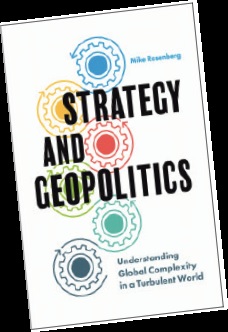When geopolitics, business collide
As we dive into 2020, here’s a thought for business leaders to ponder on as they start planning for 2020 and the years to come: Amidst the turmoil we are facing in almost all parts of the world—most prominent is the escalating conflict between the United States and Iran—is your company equipped to handle the worst possible scenario? Say, war?
Given the global nature of business these days, such concerns should be discussed by heads of organizations—but, unfortunately, it’s still a rare occurrence, says Mike Rosenberg, author of “Strategy and Geopolitics: Understanding Global Complexity in a Turbulent World.”
Speaking recently at the economic briefing of the Spanish Chamber of Commerce of the Philippines, Rosenberg says that we live now in “a time of tremendous opportunity and progress—and tremendous problems.”
“We’re living in the biggest economic expansion the world has ever seen,” says Rosenberg, who is also associate professor of strategic management of the IESE Business School of University of Navarra in Spain. “I wrote the book because I believe strongly that there is a world of diplomats, journalists, military officers, spies and analysts who spend their time looking at the geopolitical situation of the world—and then there’s the international business community, who, by and large, don’t take [geopolitics] into account when they make decisions [for their companies].”
“Strategy and Geopolitics” (available online at https://books.emeraldinsight.com/page/detail/Strategy-and-Geopolitics/?K=9781787145689), covers the different geopolitical struggles of the world, from Europe to the United States to the Middle East and Asia. He also discusses topics such as why many businesses have a hard time internalizing global complexity; a managerial framework for making sense of the world; and how to develop a resilient business strategy and organization for a complex world.Rosenberg’s goal is to provide senior business executives with a strategic framework that can help them address geopolitical issues in relation to different markets.
Article continues after this advertisement
Rosenberg makes an example of accounting terms, which he applies to a country’s geopolitical situation. “A country also has, like fixed assets, or fixed aspects, which are things that won’t change—for example, Venezuela’s enormous amount of oil deposits. But then it also has ‘current assets,’ and the current situation there now is a disaster, and it’s unclear when that is going to be resolved,” he says.He goes on further to explain that there are also “semi-fixed aspects” which business leaders need to consider. “I see the European Union as a semi-fixed part of the European fabric. It has been in place for several years, but it doesn’t have to be in place forever; will it change, evolve? We’ll see,” Rosenberg adds.
Using these analogies, Rosenberg says business leaders, like the board of directors, find the geopolitical discussion easier to relate to.
Rosenberg also advises companies not to rely too much on geopolitical forecasts, but plan their strategy based on scenarios.
“It’s not about whether [two countries] will go to war—who knows?” he says. “But what would happen to your business if they did?”
Other things business leaders need to consider when looking at geopolitics are: supply chain resilience, technological backup and intellectual property protection, diversification of risks, local strength and branding, and involvement of board directors.
“The point is, this should come from the top, and board is supposed to take the medium and long-term view of the firm. Managers might think about the next three years, but the board should be thinking about the next 10 or 20. Those men and women, I think, could think about longer-term risks,” Rosenberg says. INQ
